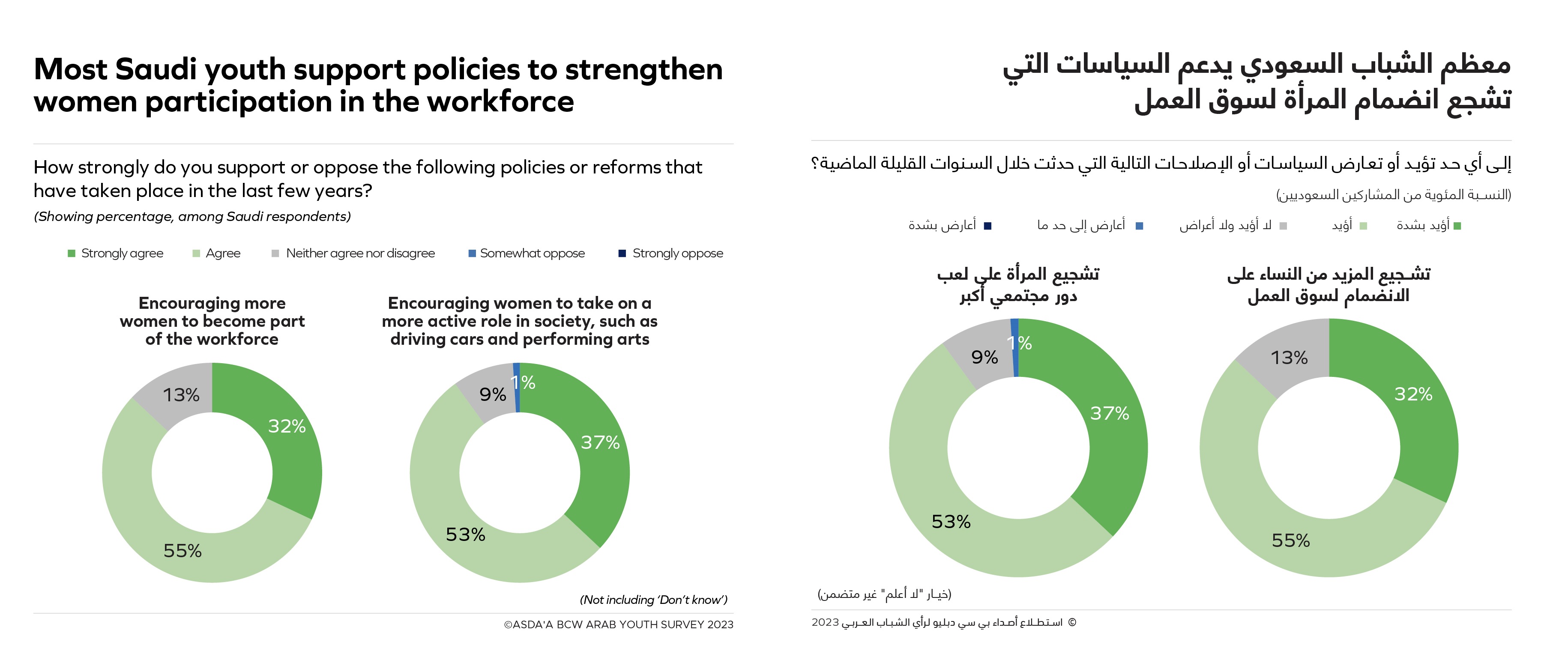- 86% of Arab youth see Saudi Arabia as a ‘strong ally’ or ‘somewhat of an ally’ of their nation
- Saudi youth endorse efforts to diversify the Kingdom’s economy, encourage more women to enter the workforce and strengthen the role of business
In what could be seen as a clear vote of confidence in Saudi Arabia’s Vision 2030 agenda for economic and social reform, Arab youth across the Middle East & North Africa now say Saudi Arabia is one of the five countries in the world they would most like their own nation to be like, according to the 15th annual ASDA’A BCW Arab Youth Survey.
Saudi Arabia is ranked among the five countries in the world Arab youth want their own to emulate for the first time in the research since 2017. Moreover, it is the first time since 2014 that three GCC countries have appeared in Arab youth’s top-five list. This arguably reflects the success of the economic diversification drive all three nations have undertaken in recent years, the feel-good factor generated by the 2022 FIFA World Cup Qatar and Expo 2020, and Saudi Arabia’s emergence as an international tourism destination and investment hub.
When asked ‘Which country in the world, if any, you would you most like your country to be like?’ - 11% of Arab men and women aged 18 to 24 across 18 Arab states said Saudi Arabia, the same percentage who named the UK. The UAE ranked first (22%), followed by the US (19%), Canada (16%) and Qatar (15%).
These are some of the key insights of the landmark survey unveiled today by ASDA’A BCW, the Middle East & North Africa’s leading communications consultancy. The annual survey is the largest study of its kind of the Arab world’s largest demographic, its over 200 million youth. This year’s overarching theme is that Arab Youth are ‘Living a New Reality.’
In other findings, Saudi Arabia was ranked as a top ally of their country by 86% of the sample, with 54% of Arab youth naming it as a ‘strong ally’ and 32% describing it as ‘somewhat of an ally’. More than nine in 10 (92%) said Qatar was a ‘strong ally or somewhat of an ally’ of their country, followed by Kuwait (91%), Egypt (89%) and the UAE (88%).
Asked about Saudi Arabia’s ongoing economic and social reforms, the survey found that young Saudi men and women strongly support the changes. Nine in 10 (90%) said they supported policies to encourage more Saudi graduates and school-leavers to pursue careers in the private sector, while 91% said they supported a larger role for the private sector in the overall economy. A full 96% said they approved of the various tourism and leisure ‘giga projects’ taking shape in the Kingdom aimed at stimulating economic diversification and job creation.
More than 8 in 10 Saudi youth said they supported the strategy to diversify the economy away from oil & gas as well as to incentivise foreign companies to move their headquarters to the Kingdom.
An overwhelming 89% of Saudi respondents also said they endorsed policies encouraging women to play a more active role in society, such as rules allowing them to drive and to participate in the performing arts. A full 86% of respondents also said they were in favour of women joining the workforce.
Sunil John, President, MENA, BCW and Founder of ASDA’A BCW, said: “As a member of the G20, Saudi Arabia has now firmly established its credentials as a major economic power, with a GDP now exceeding US$1 trillion and is on course to double by the end of the decade. Saudi Arabia is not only recognised as the world’s dominant oil & gas producer, but also as a growing hub for tourism, music, the arts and sports – as well as for renewable energy, sustainable urban development and AI. Without question, one of the engine rooms of the global economy of the 21st century will be Saudi Arabia.”
“Clearly, a mood of optimism is taking hold among Saudi youth, which our latest Arab Youth Survey reflects,” added John. “Perceptions of Saudi Arabia outside the Kingdom have also improved, which is another significant trend. Our latest survey suggests that the changes underway in the Kingdom are seen by the region’s youth as a successful model for their nations to follow.”
ASDA’A BCW commissioned SixthFactor Consulting, a leading research company, to conduct face-to-face interviews with 3,600 Arab citizens aged 18 to 24 in their home nations from March 27 to April 12, 2023.
The largest sample in the survey’s history was equally divided between men and women in 53 cities across a total of 18 Arab states, including for the first time South Sudan. The interviews were deliberately conducted face to face rather than online to maximise their accuracy and to reflect the nuances of Arab youth opinion across the region as much as possible.
To know more about the findings, log on to arabyouthsurvey.com
-ENDS-













